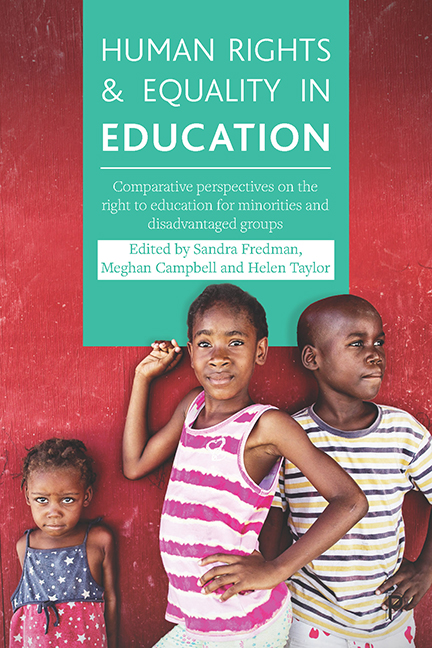 Human Rights and Equality in Education
Human Rights and Equality in Education Published online by Cambridge University Press: 19 April 2022
Education is at the heart of the global struggle to alleviate poverty and reduce inequality. It has been demonstrated that one extra year of education is associated with a reduction in inequality (as measured by the Gini coefficient) of 1.4 percentage points. Yet it is precisely the most disadvantaged who face the greatest obstacles to accessing quality education. Although some progress has been made in recent decades, there were still as many as 57 million out-of-school children of primary school age in 2015. Many of these will never access education. What role, then, can human rights play in addressing these issues? Education has been recognised as a fundamental human right at least since 1948, when the Universal Declaration of Human Rights declared that everyone has the right to free and compulsory education. Importantly, the right extends beyond access to education. It also includes quality education. Education must be ‘directed to the full development of the human personality’ and ‘promote understanding, tolerance and friendship among all nations, racial or religious groups’. The right to education has also been recognised in the major international human rights instruments, and in the domestic law of numerous countries.
This volume asks what role human rights can play in addressing some of the most challenging issues in the quest for quality education for all. We provide case studies from both the global South and the global North. The challenges are surprisingly similar, despite marked differences in development. From the South, we focus on India, Kenya and South Africa. Both countries face an enormous chasm between the ideal of equal rights to quality education and the reality; each has relatively recently given entrenched constitutional status to the right to education; and both have seen human rights litigation play an important part. From the global North, we look at New York State, where educational disadvantage, in the midst of the richest country in the world, is even more striking. Although there is no constitutional right to education at federal level, the right is entrenched in the New York State constitution, and human rights litigation has been utilised in the quest for a better quality of education for disadvantaged innercity children.
To save this book to your Kindle, first ensure no-reply@cambridge.org is added to your Approved Personal Document E-mail List under your Personal Document Settings on the Manage Your Content and Devices page of your Amazon account. Then enter the ‘name’ part of your Kindle email address below. Find out more about saving to your Kindle.
Note you can select to save to either the @free.kindle.com or @kindle.com variations. ‘@free.kindle.com’ emails are free but can only be saved to your device when it is connected to wi-fi. ‘@kindle.com’ emails can be delivered even when you are not connected to wi-fi, but note that service fees apply.
Find out more about the Kindle Personal Document Service.
To save content items to your account, please confirm that you agree to abide by our usage policies. If this is the first time you use this feature, you will be asked to authorise Cambridge Core to connect with your account. Find out more about saving content to Dropbox.
To save content items to your account, please confirm that you agree to abide by our usage policies. If this is the first time you use this feature, you will be asked to authorise Cambridge Core to connect with your account. Find out more about saving content to Google Drive.